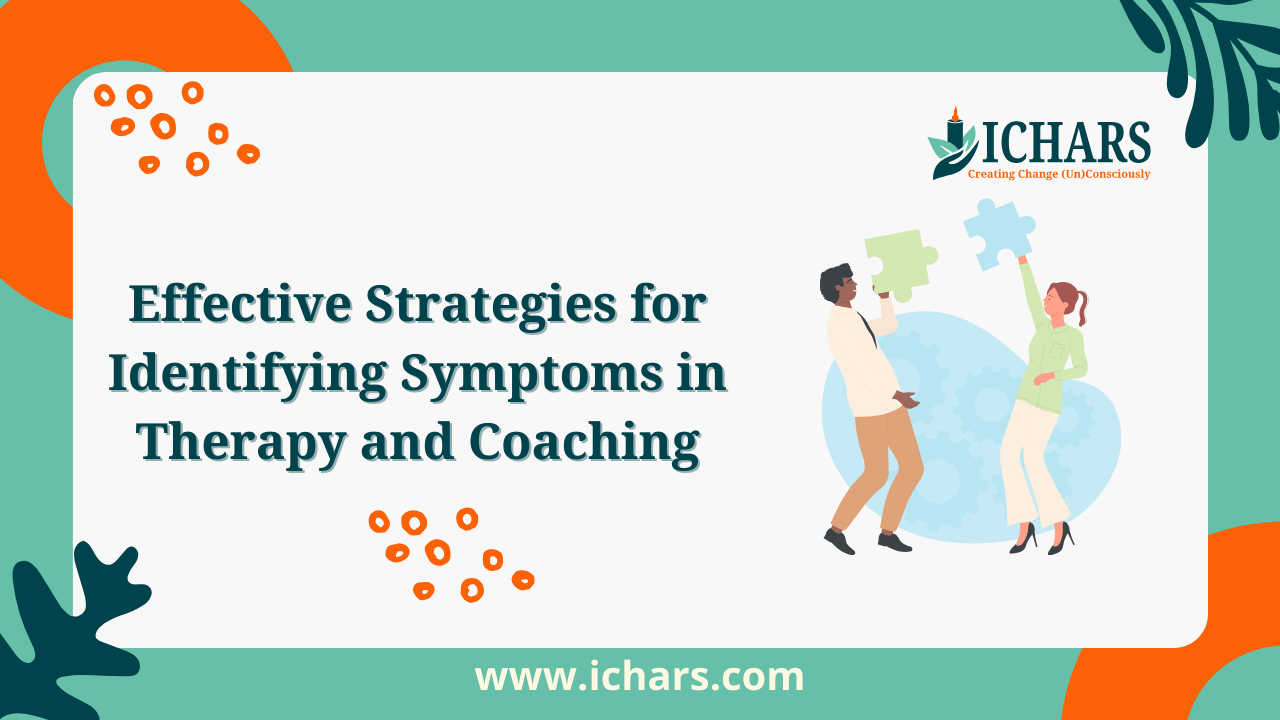In the nuanced domain of coaching and therapy, one question often arises:
How can practitioners effectively identify the subtle symptoms that indicate deeper issues?
Without mastering this critical skill, could your interventions fall short, leaving clients stuck and their progress stunted?
The frustration of missing key symptoms can lead to ineffective treatment plans and unfulfilled client potential. But what if there was a way to ensure you never overlook these vital signs?
Accurately identifying symptoms is not just a blend of observational acumen and theoretical knowledge; it’s the cornerstone of successful coaching and therapy. This competency, situated at the intersection of science and intuition, empowers practitioners to discern the subtle cues that signal deeper issues, enabling precise, tailored interventions.
In this article, we will explore strategies and insights to enhance this vital skill, ensuring your practice can effectively recognize and address the symptoms clients present, paving the way for transformative healing and growth.
Why Identifying Symptoms Matters
Just like detectives gathering clues, coaches and therapists rely on symptoms to understand a client’s challenges. These symptoms can be physical, emotional, or behavioural and often point to deeper patterns. Mastering this skill allows you to:

- Develop targeted interventions: By uncovering the root cause, you can tailor your approach to address the specific needs of each client.
- Track progress more effectively: Monitoring symptom changes helps you evaluate the effectiveness of your interventions and adjust as needed.
- Empower clients: Understanding their symptoms empowers clients to take control of their well-being and navigate challenges more effectively.
Developing Your Symptom Identification Skills
- Education and Training: Invest in courses on psychological assessment, emotional regulation, and common mental health conditions.
- Experience is Key: Supervised clinical experience or coaching practicums provide invaluable hands-on learning.
- Broaden Your Knowledge: Consider studying areas like neuroscience and holistic health to gain a comprehensive understanding of human behaviour.
- Sharpen Your Observation Skills: Pay close attention to verbal and nonverbal cues during sessions. Notice changes in body language, tone of voice, and emotional expression.
- Reflective Practice: Regularly reflect on your sessions to identify patterns and areas where you can refine your symptom identification skills.
- Peer Collaboration: Discuss challenging cases with colleagues or mentors to gain different perspectives.
- Stay Updated: Continuously learning from research and professional literature keeps your knowledge base current.
Putting It into Practice: Strategies for Coaches and Therapists

- Intake Assessments: Utilize standardized tools to gather initial symptom data systematically.
- Observation and Note-Taking: Document client behaviours and speech patterns objectively.
- Open-Ended Questions: Use targeted inquiries to explore underlying thoughts, feelings, and experiences.
- Dynamic Session Planning: Adapt your interventions based on symptoms that emerge during sessions.
- Cross-referencing Symptoms: Link observed symptoms to potential underlying conditions, considering the client’s history.
- Client Feedback: Encourage clients to share their experiences with symptoms, as their insights can be invaluable.
- Collaboration with Other Professionals: When needed, collaborate with other mental health professionals for a holistic understanding.
Overcoming Challenges and Pitfalls
Common challenges in symptom identification include:
- Confirmation Bias: Combat this by seeking information that challenges your assumptions.
- Client Resistance or Concealment: Create a safe environment that encourages disclosure.
- Overpathologizing Normal Behaviour: Differentiate between normal and concerning behaviours.
- Language and Cultural Differences: Employ culturally sensitive communication.
- Complex Symptom Clusters: Break down symptoms and address each part individually.
Employing these strategies helps navigate the complexities of symptom identification, leading to accurate assessments and tailored interventions.
Cognitive Hypnotic Coaching Framework’s Techniques for Enhancing ‘Identifying Symptoms’
The Cognitive Hypnotic Coaching (CHC) framework offers techniques to enhance symptom identification:
- NLP Meta Model: This technique uses precise questioning to challenge and clarify the client’s language, uncovering hidden meanings and deeper issues behind symptoms.
- NLP T.O.T.E (Test, Operate, Test, Exit): This model helps in understanding the client’s mental and behavioural processes, identifying inconsistencies or problematic patterns that manifest as symptoms.
- Mindfulness: Encouraging clients to become more aware of their present moment experiences can reveal subtle symptoms and underlying issues.
- Sensory Specific Questioning: Using questions that focus on sensory details helps clients articulate their experiences more vividly, aiding in symptom identification.
- Behavioural Observation: Detailed observation of client behaviour and language to notice symptomatic clues that might otherwise go unnoticed.
- Psychoeducation: Educating clients on symptoms and their origins empowers them to become more aware of their experiences.
- Systemic Questioning: Strategic questioning techniques unravel the multi-layered nature of symptoms.
- Hypnotic Exploration: Utilizing trance states and guided visualization to bring subconscious symptoms to the surface.
- Feedback Loops: Regular feedback mechanisms to refine the understanding of the client’s symptoms.
- Collaborative Analysis: Jointly analyzing symptoms with clients to enhance accuracy and shared understanding.
By integrating these powerful question techniques, practitioners can identify symptoms with increased precision, leading to more effective and personalized interventions.
Conclusion
Mastering the competency of Identifying Symptoms enriches coaching and therapy, requiring attention to detail, analytical acumen, and compassion. Integrating the Cognitive Hypnotic Coaching framework’s techniques and committing to ethical practice enhances practitioners’ abilities, leading to deeper client understanding and meaningful transformations. Investing in quality training, like the Cognitive Hypnotic Coaching Diploma, equips practitioners to meet clients’ multifaceted needs effectively.
Arming yourself with the knowledge and skills to discern underlying issues accurately is not just beneficial – it’s essential. This capability not only enhances the practitioner’s acuity but also amplifies the potential for client success. Read on to unlock the full potential of your practice by mastering symptom identification today.

